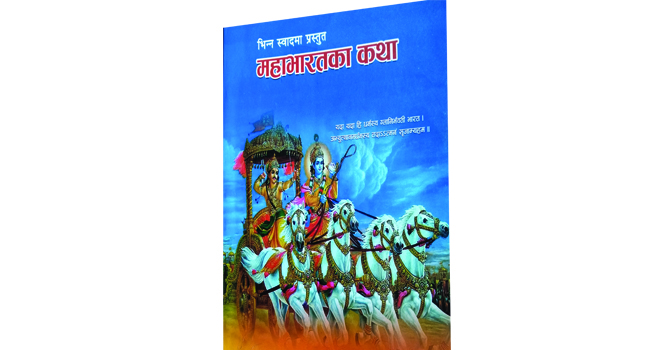Mahabharata Stories In Different Taste

Gandhi Raj Kafle
There is no need to add anything more to describe the importance of the Vedic epic of the Mahabharata because we have a quote of the Great Poet Bed Byas himself (this is written in the second page of the preface of the author of this book): 'All, which is in this world is in the Mahabharata and that which is not in this book is not there in the world.' Byas, whom we regard as one of the Astachirajibis (one of the eight immortal persons) in the Vedic civilization, is precise in his saying.
The context here is a book of the Mahabharata stories written in different taste in the Nepali language. The author of this under review book is Prakash Mani Dahal, who has more than a dozen literary works to his credit. His gist version of the Mahabharata stories in the English language which he published five years ago entitled, "The Mahabharata in Series" also needs to be remembered in this context.
The merit of this book as claimed by the author is — it is presented in a different flavour. It is that merit under which the author has presented the same original Sanskrit stories of the Mahabharata in the simple Nepali language. Indeed, the claim is true because it is sweet and short.
The Mahabharata tells the stories which have always enhanced the curious mind and soul of authors here and beyond borders. Dahal, too, is one of the authors of this kind and now he has succeeded to make his inquisitive mind productive by writing books on the evergreen stories of the Mahabharata.
Prof Gopi Krishna Sharma's words 'this book of Mahabharata stories is impressive and well constructed because of the sweet and natural Nepali language' for the author are relevant to mention.
If we go to all the sixteen titles of the stories in the book, there is not a single piece, which is not popular or not heard. The background of the Mahabharata, which the author has told here in the title of "Story of the Stories," is also a must-know theme for readers.
In some pieces, the author has chosen descriptive narration. This is interesting because the characters of the Mahabharata are famous and inspiring even today. Some such incomparably brave mythical persons about whom the author has described admiringly in the book are Karna, Barbarik and Eklavya.
Truly speaking, the Mahabharata stories are made of so many entangling myths, facts, connectivity of characters who love to clash bravely over the matters of their interests with logic and reasons. Thus, vision is there, but confusion prevails.
But, who is the mover and shaker of all such complex activities? He is none other than Lord Krishna, the incarnation of Lord Bishnu. The importance of the Mahabharata epic can hardly be described.
Speaking about author Prakash Mani Dahal, he is the person who had earlier written the Mahabharata series in the English language. It is heartening to see his new book on the same theme again.
The Mahabharata stories are not only admired in our region, they have attracted high regards from the Western World society of scholars also.
The following two quotes from Dahal's forewords in the book are worthy to mention:
Dr Moriz Winternitz says about the Mahabharata –
'Out of this unshapely mass shines out the most precious blossoms of immortal poetic art and profound wisdom.'
Indian author Tarun Tejpal says – 'The religion is the disciplinarian fantasy of a schoolmaster. The Mahabharata is the joyous song of life of a maestro'.'
Thus, there are a few things, which must not be forgotten to mention in the context of this under review book on the Mahabharata stories. It is important to understand the powerful king Yayati episode in the context of the 18-day long war of the Mahabharat which claimed more than four million lives in this sacred land. Or, for that matter, it is also equally meaningful to know about the theft of a holy cow, Kamadhenu, at the hermitage of Rishi Bharadwaj by eight deities known as Astabashu.
These two stories are relevant and this book offers answers to many curiosities of readers in a simplified version of our language. Furthermore, if we try to find connectivity of stories in terms of values of society, there are precious lessons to learn from the stories entitled, "Kathaharuko Katha" and "Aeuta Bishesh Gurudkshina' in the book.
Author Dahal has appropriately chosen stories from huge Mahabharata epic purposively to present some sublime themes for readers.
In conclusion, what can be said is sometimes even minor incident can become a cause of huge disaster; even the war like the Mahabharata can occur. The selective stories of this book have amply focused this part for readers. No doubt, this is an impressive book for those who revel in reading Mahabharata stories and incidents.
Recent News

Do not make expressions casting dout on election: EC
14 Apr, 2022
CM Bhatta says may New Year 2079 BS inspire positive thinking
14 Apr, 2022
Three new cases, 44 recoveries in 24 hours
14 Apr, 2022
689 climbers of 84 teams so far acquire permits for climbing various peaks this spring season
14 Apr, 2022
How the rising cost of living crisis is impacting Nepal
14 Apr, 2022
US military confirms an interstellar meteor collided with Earth
14 Apr, 2022
Valneva Covid vaccine approved for use in UK
14 Apr, 2022
Chair Prachanda highlights need of unity among Maoist, Communist forces
14 Apr, 2022
Ranbir Kapoor and Alia Bhatt: Bollywood toasts star couple on wedding
14 Apr, 2022
President Bhandari confers decorations (Photo Feature)
14 Apr, 2022










